The Special Operations Executive was founded in 1940 to sabotage the Nazis using any means necessary, from exploding rats to itching powder.
When Britain stood alone against the Nazis at the outset of World War II, Prime Minister Winston Churchill realized that his island nation would have to use every resource and tactic available to defeat the storm of evil that had enveloped much of the European continent. So, he established an underground army called the Special Operations Executive — also known as the “Ministry of Ungentlemanly Warfare.”
The SOE operated outside the conventional rules of warfare. It supported resistance movements in occupied countries, carried out a range of covert operations, and developed innovative guerrilla warfare techniques and equipment.
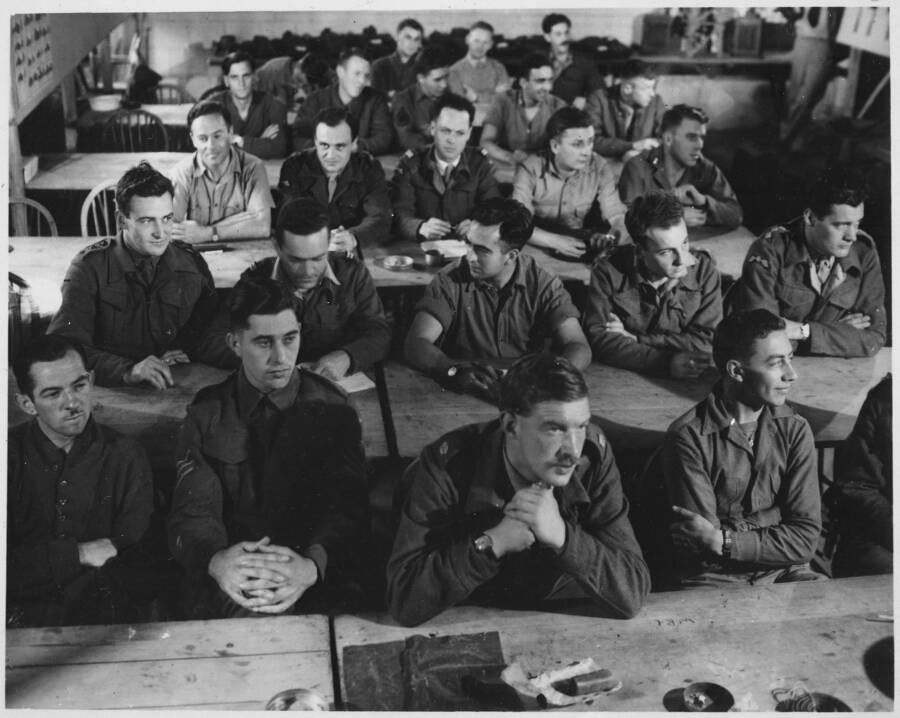
Public DomainBritish Special Operations Executive agents in a demolitions class circa 1944.
The SOE employed a variety of people from both military and civilian backgrounds for its secretive missions. This included scientists, engineers, and inventors who worked to develop various new tools and weapons of sabotage.
While some of the ministry’s tactics might seem more suited to a James Bond script than to real life, the ultimate success of these operations is a true testament to the power of human ingenuity.
The Formation Of The ‘Ministry Of Ungentlemanly Warfare’
Dismayed by the rapid fall of France in 1940 and eager to take the fight directly to the enemy, Prime Minister Winston Churchill envisioned a secret organization that would carry out acts of sabotage, subversion, and support for resistance movements in Nazi-occupied Europe.
He tasked Hugh Dalton, the Minister of Economic Warfare, with forming this clandestine force. Dalton, inspired by the tactics of the Irish Republican Army (IRA), drew up plans for a centralized sabotage organization.
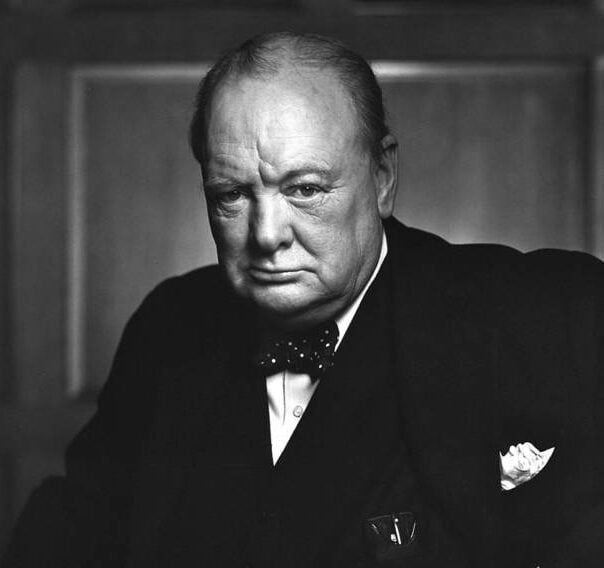
Wikimedia CommonsWinston Churchill was an avid supporter of the Special Operations Executive.
On July 22, 1940, Churchill formally approved the SOE, instructing its agents to “set Europe ablaze.” The organization merged three existing secret departments, creating a force dedicated to unconventional warfare behind enemy lines. In October 1941, Sir Frank Nelson was appointed as the head of the SOE.
Not long after its formation, the SOE conducted numerous small operations, making it difficult to pinpoint the organization’s very first mission. That said, there was one standout operation early on that truly set the standard for how the SOE would conduct its future missions: Operation Postmaster.
Operation Postmaster: A Daring Raid In Neutral Waters
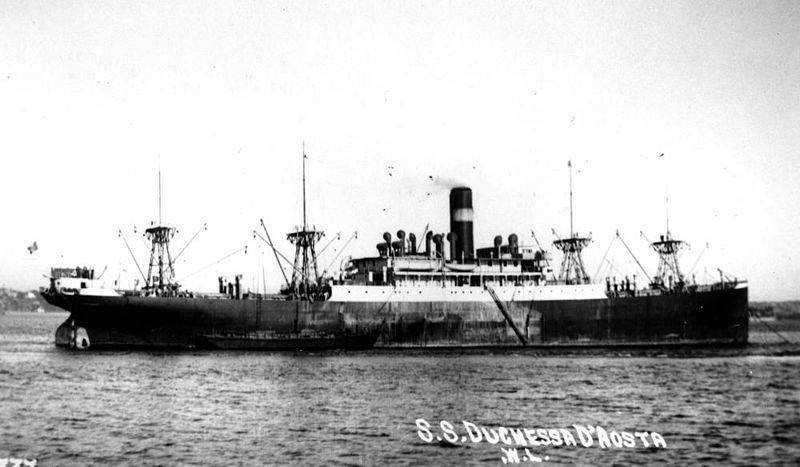
Public DomainThe Italian cargo liner Duchessa D’Aosta.
In January 1942, British officials learned that the Duchessa d’Aosta, an Italian ocean liner at port on the Spanish island Fernando Po, was actually a listening vessel supplying the Germans with Allied shipping movements. The Duchessa was soon joined by the German ships Likomba and Bibundi, convincing the British that the time had come to act.
There was one problem: Fernando Po was controlled by Spain, an officially neutral country. A blatant attack on the ships in a neutral port could push Spain to fight for the Axis powers. With the strongest navy in the world unable to act for political reasons, it was time to call in the “ungentlemen.”
Brigadier Colin Gubbins came up with an ingenious plan known as Operation Postmaster: With a handful of agents, some help from the locals, and a few well-placed minor explosives, he would cause the three ships to simply vanish from the harbor. The threat of the spying ships would be removed and the Allies could claim ignorance.
Although Spain was officially neutral, the governor of Fernando Po, Captain Victor Sanchez-Diez, was decidedly pro-Nazi. With some help from agents in place on the island (including the local British chaplain), Gubbins not only managed to acquire some compromising photos of Sanchez-Diez with his mistress (which they used as leverage to convince him to loosen up the security on the island) but even managed to slip an agent onto the Italian ship, where he discovered that the sailors were astonishingly lax in their guard duties.
One night, under the cover of darkness, a small group of Special Operations Executive agents slipped into the harbor in two tugboats. The captains of all three ships had been invited to a fabulous party that evening arranged by a local named Abelino Zorilla.
Zorilla was an excellent host and master of detail, and he kept the alcohol flowing and arranged the seating plan so his honored guests had a full view of the party with their backs to the window. Conveniently, he was also a devoted anti-fascist recruited by the British to assist with the mission.
As the party got underway, the commandos boarded the Axis vessels, overpowered the skeleton crews that had been left behind on guard duty, and severed the chains docking the ships with explosives. In no time at all, the three boats were being tugged out to sea before vanishing into the night.
Of course, not even the drunkest German officers could fail to hear the tremendous explosions from the harbor. Initially thinking it was an air raid, they launched anti-aircraft fire and sent the entire island into a general panic.
When they finally realized there was no attack from the skies, the drunken crews made their way down to the docks to find their ships gone without a trace. The shock of the inebriated sailors made for such a spectacle that the locals who had gathered around erupted into full-blown laughter.
The captain of the Likomba, however, did not find the situation quite so funny. He stormed into the British Consulate, demanding to know what they had done with his ship. In his frustration, the captain actually lashed out at the consul, prompting the vice-consul to hit him with a left hook so vicious that the German “collapsed in a heap, split his pants and emptied his bowels on the floor,” as detailed in Shadow Knights: The Secret War Against Hitler.
The SOE agents had suffered no casualties, successfully eliminated the threat of the three vessels, and, most importantly, avoided an outright violation of Spain’s neutrality. And the Allies were able to completely deny responsibility, not-quite-untruthfully declaring that no British ship had been in the vicinity of Fernando Po that particular evening.
The SOE’s reputation for carrying out delicate and dangerous missions was successfully established.
The St. Nazaire Raid
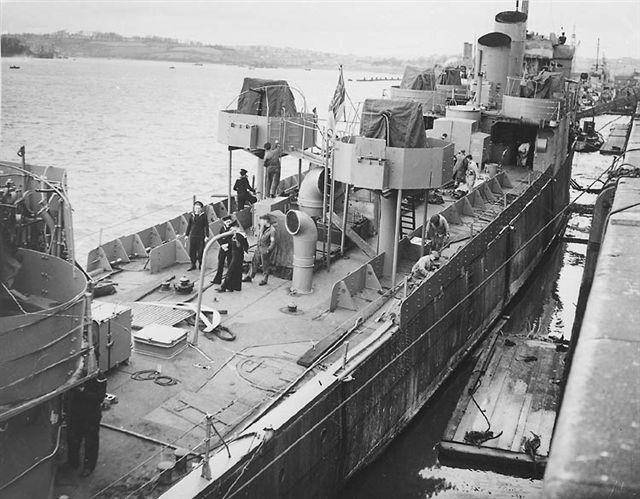
Public DomainThe HMS Campbeltown being prepared for the St. Nazaire raid.
Two months after Operation Postmaster, the SOE carried out a raid that showed just how cunning and deceptive the specialized group could be.
In 1942, the Tirpitz was one of the most powerful warships in the world. Unfortunately for the British, she was also the latest addition to Hitler’s navy.
Churchill knew that, if unleashed in the Atlantic, the vessel would be able to inflict incalculable damage on the convoys that were so vital to Britain’s survival. The prime minister even stated that “the whole strategy of the war turns at this period on this ship,” according to the National World War II Museum.
The Tirpitz was too big and too well-defended to be sabotaged outright, so the wily minds at the Special Operations Executive came up with an entirely new strategy: If they couldn’t hit the ship directly, they would instead sabotage the dock she relied on for repairs and leave her without a safe haven.
The Special Operations Executive was able to determine that the only dock capable of repairing a ship the size of the Tirpitz was the Normandie dry dock at St. Nazaire in Nazi-occupied France. If the dock were to be destroyed, the Tirpitz would be forced to return to Germany for any repairs via the English Channel.
Since St. Nazaire was of such strategic importance, it was heavily defended. The dock itself was enormous and would require a tremendous amount of explosives to be brought in at close range.
In a daring plan, it was decided that agents would pack an old destroyer to the brim with delayed-action explosives and have a team of commandos navigate it up the channel before ramming directly into the dock’s gates.
The men selected for the mission knew that they had a very slim chance of getting out alive and that the entire plan hinged on the effectiveness of the delayed-action fuses (which had been specially developed by the Special Operations Executive’s explosives expert). If the fuses went off too soon, the HMS Campbeltown would be blown to pieces with the entire crew still on board. Despite the enormous risk, the mission went forward.
Disguised as a damaged German destroyer requesting permission to dock, the Campbeltown and her crew initially managed to surprise the Germans and delay any response. After the ruse was inevitably discovered, the ship took heavy fire from all sides before she, at last, hit her target and rammed into the gates of the dock.
Chaos reigned until the early hours of the morning, with two-thirds of the Special Operations Executive commandos captured or killed. The Campbeltown was slated to explode at 7 a.m., and as the surviving agents were rounded up, they all began counting down the minutes.
When it reached 11 a.m. on the morning of March 28, the SOE agents gave up hope and accepted their mission as a failure. To add insult to injury, one German officer began to taunt them, telling his captives that “your people obviously did not know what a hefty thing that lock-gate is.”
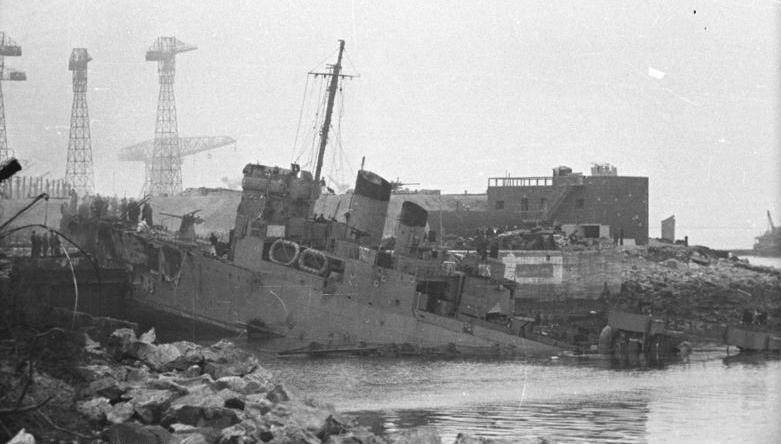
German Federal Archives/Wikimedia CommonsThe destroyed St. Nazaire docks.
Then, in a moment that could not have been more perfectly timed in any Bond film, the Campbeltown exploded with such force that the locals thought an earthquake had struck St. Nazaire. With remarkable sangfroid, one of the British officers simply replied, “That, I hope, is proof that we did not underestimate the strength of the gate.”
Although victory had come at the cost of 169 agents killed in action, the Normandie dock was out of commission for the next decade, and the dreaded Tirpitz did not venture into the Atlantic for the rest of the war.
The Aftermath Of The St. Nazaire Raid
While the SOE suffered major losses of their own during the raid, it was by all means a major strategic victory — and considered by many to be one of the most daring and successful commando operations of World War II.
Unfortunately, it also deeply angered Hitler, who then issued the infamous “Commando Order” calling for the execution of captured operatives.
Still, the mission’s success proved the true capabilities of the SOE, and throughout 1942, they continued their operations with a sense of renewed purpose.
Less than two months after the raid, they would embark on another dangerous mission — one that sought to eliminate one of Germany’s top Nazis.
The Special Operations Executive’s Operation Anthropoid
If there was one man who embodied everything that the Special Operations Executive was fighting against, it was Reinhard Heydrich.
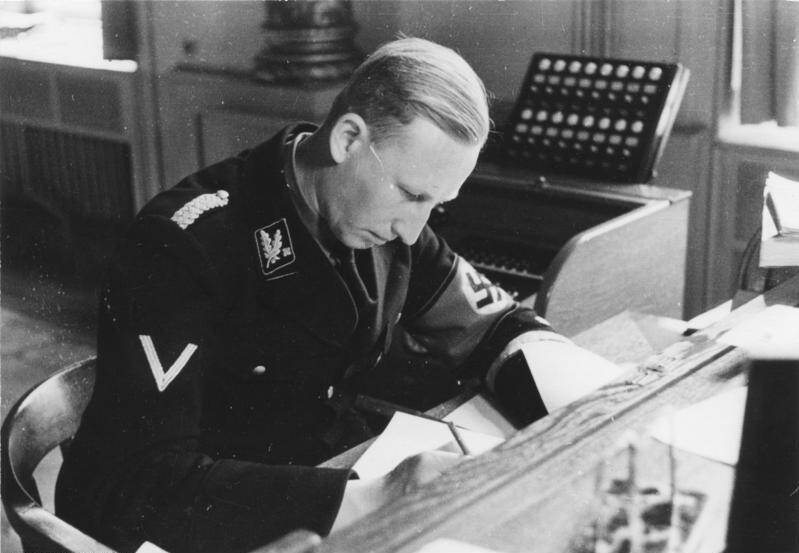
German Federal Archives/Wikimedia CommonsReinhard Heydrich, the target of Operation Anthropoid.
Dubbed by Hitler himself as “the man with the iron heart,” Heydrich was the head of the dreaded Gestapo and the mastermind behind both the Kristallnacht pogrom and the infamous Wannsee Conference held to organize the “final solution” to the Jewish question. The “solution” determined at that conference would soon claim the lives of millions of men, women, and children across Europe.
In 1941, Heydrich was appointed Reichsprotektor of what is now the Czech Republic, where he was so ruthless with his arrests and executions that he earned himself the nickname “the butcher of Prague.” Despite Heydrich’s efforts to crush the will of the entire country, the Czechs ran an effective resistance network — aided and abetted by Britain’s Special Operations Executive.
Together with the SOE, the exiled Czechs came up with a plan to take out the Nazis terrorizing their homeland. Although they knew the German reprisals would be swift and merciless, Heydrich was already murdering so many civilians that they determined the benefits of assassinating such a high-ranking officer would far outweigh the risks.
Czech soldiers had been training alongside SOE commandos at a top-secret camp in Britain, where they became skilled in the arts of sabotage and killing. The Head of Czech Intelligence hand-picked two of the most skilled officers to carry out the assassination: Jan Kubiš and Jozef Gabčík.
Armed with grenades, machine guns, and pistols, the team was dropped behind enemy lines to hide until they could carry out the attack. Thanks to intelligence from anti-Nazi locals, the SOE knew that Heydrich traveled in an open-top, armor-plated Mercedes.
The plan was to plant Kubiš and Gabčík at a bend in the road on the car’s daily route from Prague, where it would be forced to slow down and they would be able to hit the vehicle with machine-gun fire and explosives.
On the day of the assassination, May 27, 1942, Heydrich chose to spend some extra time with his family, throwing off his usual routine. After a tense half-hour of waiting, the two commandos at last saw the Mercedes slowing down around the bend. Gabčík stepped in front of the car intending to shoot both Heydrich and his driver, but his machine gun jammed, leaving him exposed in the open road.
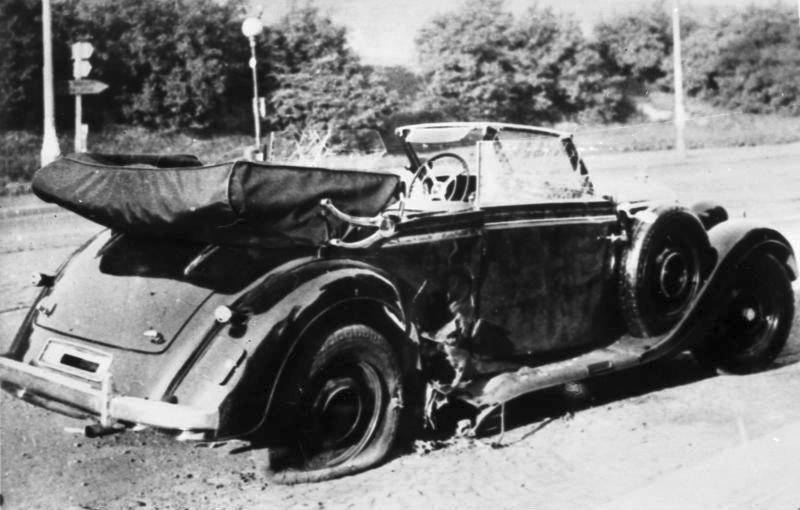
German Federal Archives/Wikimedia CommonsReinhard Heydrich’s car after the attack.
When Heydrich and his bodyguard stepped from the vehicle to kill the would-be assassin, Kubiš lobbed his grenade and managed to hit the rear of the Mercedes.
Although Heydrich was not hit directly, the explosive did its job: He was badly injured by shrapnel, and the force of the blast drove pieces of the car and dirt into his wounds, which became infected and killed him eight days later.
Kubiš and Gabčík managed to escape the scene, but, as they anticipated, the Nazi reprisals were swift and fearsome. The two were eventually tracked down and killed, along with dozens of other Czech civilians accused of aiding them. Nevertheless, for all of the horror of its aftermath, Operation Anthropoid was considered the Special Operations Executive’s highest-profile success.
Then, in early 1943, the SOE would prove that sabotage was not its only strong suit.
Operation Mincemeat
In February 1943, Major-General Colin Gubbins assumed leadership of the SOE. Gubbins’ approach was more aggressive, leading to intensified operations that took even greater risks.
Gubbins was a strong proponent of “doing and not just planning” and sought to dismantle and disrupt the German war effort no matter the cost. As a result, agent fatalities increased — but so did the organization’s effectiveness.
Gubbins particularly fostered closer integration between SOE operations and the overall Allied war plan, which would eventually translate into vital D-Day missions focused on crippling German communications and transport networks.
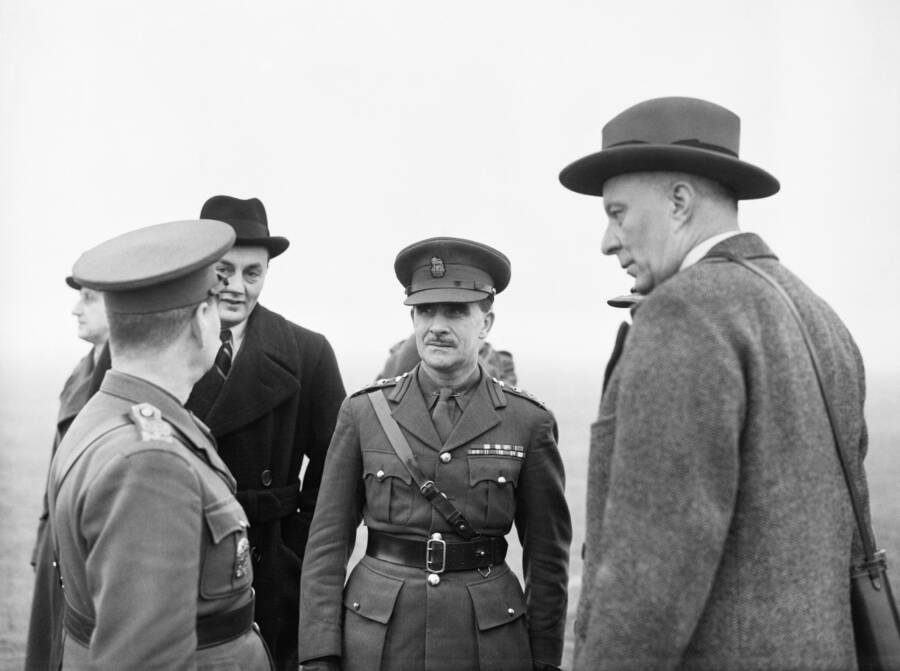
Public DomainColin Gubbins (center) the Chief of the Special Operations Executive.
This brings us to April 1943, when the SOE, under Gubbins’ command, conducted Operation Mincemeat. Unlike previous operations, Mincemeat’s goal was not to destroy German assets but rather to confuse the Nazis and supply them with false information.
The operation began when the British obtained the corpse of a homeless Welshman by the name of Glyndwr Michael, who had died from ingesting rat poison. SOE operatives disguised Michael as a fake Royal Marines officer named William Martin, planting meticulously crafted false documents on the body that detailed Allied plans to invade Greece and Sardinia, with Sicily acting as a diversionary target.
Among these false documents were personal letters and official-looking plans detailing troop movements and landing zones.
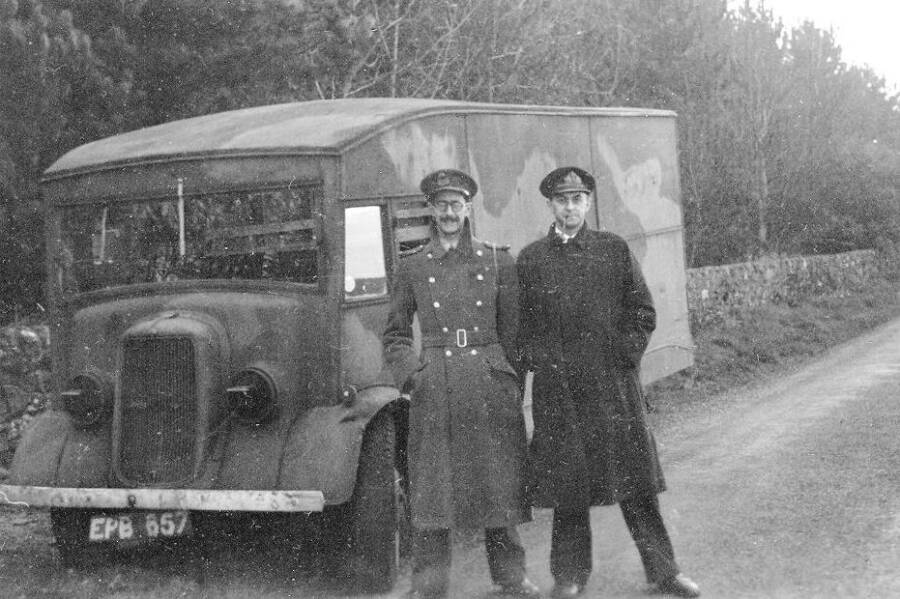
Public DomainCharles Cholmondeley and Ewen Montagu on April 17, 1943, transporting Glyndwr Michael’s body.
Michael’s body was then released off the coast of Spain — a country known for its neutrality but with connections to German intelligence.
As expected, Michael’s body and the false documents came into the possession of German intelligence. Thankfully, they took the bait, and as a result, they diverted troops and resources away from Sicily and toward Greece and Sardinia.
Then, in July 1943, the Allies invaded Sicily in what’s known as Operation Husky and faced significantly less resistance than they would have had the SOE not intervened. Operation Mincemeat was a landmark moment for the organization, but it also further illustrated the benefits of deception in times of war.
Curiously enough, the initial idea for this deceptive tactic came from James Bond creator Ian Fleming, who was at the time the assistant to Admiral Godfrey, the Director of Naval Intelligence.
Then, in October 1943, the SOE once again proved that it was no one-trick pony, illustrating its adaptability in obtaining vital supplies during Operation Bridford.
Operation Bridford
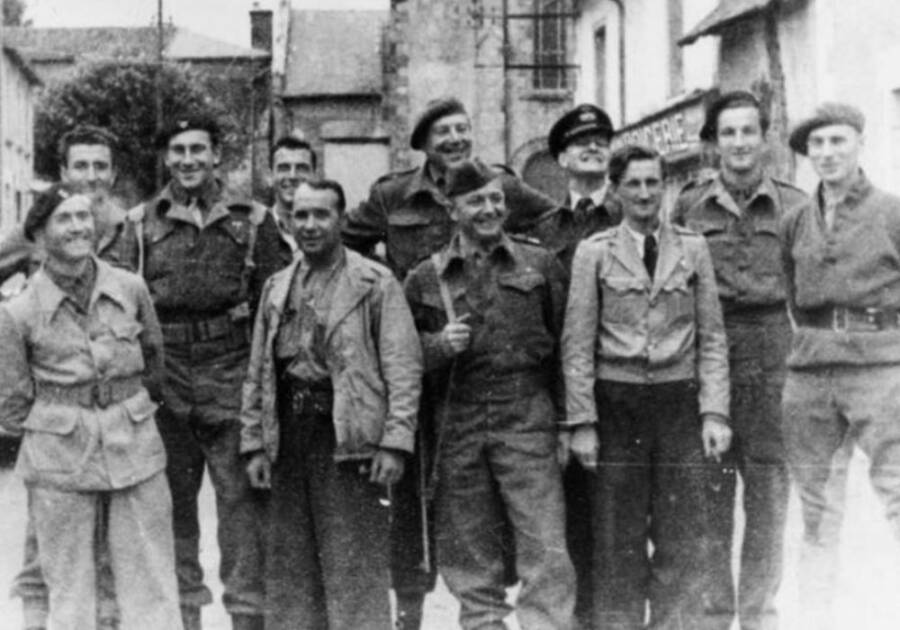
Imperial War Museum/Wikimedia CommonsSpecial Operations Executive agents in southern France in 1944.
Ball bearings aren’t exactly the stuff that makes for the plot of a glamorous wartime spy mission. Yet, technical and dry though the term might sound, ball bearings were crucial to the war effort, as they were necessary to run any kind of engine.
By 1941, the British were running dangerously low on this important technology because the Germans had successfully destroyed all of their factories producing the bearings. The British had equal success in destroying the Germans’ factories, meaning that there was only one country in Europe left successfully producing ball bearings: Sweden.
Like Spain, Sweden was officially a neutral country. Also like Spain, Sweden was much less hesitant to provide assistance to the Germans than to the British, particularly when it came to supplying the warring powers with ball bearings.
Once again, the British needed to somehow meet their objective without violating another country’s neutrality: another mission for the Special Operations Executive. A group of modern-day swashbucklers and Vikings led by a dashing Arctic explorer on a mission to cross enemy lines in the freezing Baltic — now that is the stuff of a glamorous spy story.
Sir George Binney was working as the representative of the U.K. Ministry of Supply in Sweden when the war broke out. His job had been to obtain steel, tools, and other supplies (ball bearings among them) to send back to Britain.
Once the war began, he needed to come up with slightly more ingenious methods for accomplishing his task. A former Arctic explorer, Binney was no stranger to organizing dangerous missions in freezing conditions, and together with the Special Operations Executive, he managed to work out a brilliant plan named Operation Bridford.
Back in the late 1930s, Turkey had commissioned eight motor gunboats from Britain. These vessels were larger than the average motorboat but still capable of moving quickly through the water. After the war started, the Royal Navy requisitioned these vessels and outfitted them with even more guns. The Special Operations Executive determined they would be perfect for a series of blockade-running operations.
The missions were planned for September 1943, when the agents would be able to take advantage of the maximum hours of darkness. The motorboats would need to make the two-day journey to Sweden, pick up supplies without detection, and then make the two-day return journey, all the while avoiding the German Baltic Navy.
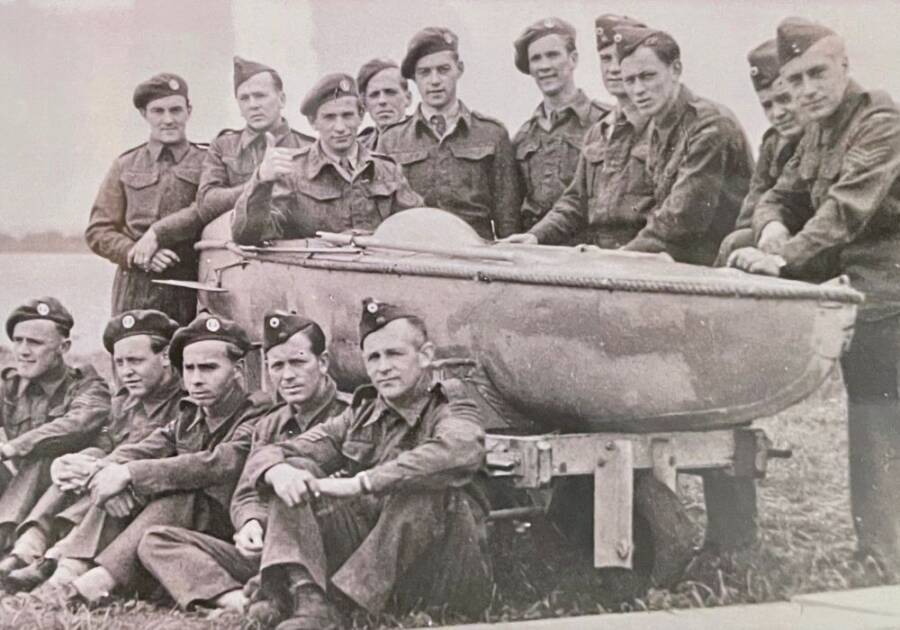
Royal Norwegian Navy Museum/Wikimedia CommonsNorwegian exiles in Scotland posing with a vessel built by the Special Operations Executive for clandestine attacks.
For diplomatic purposes, the boats could not be manned by the Royal Navy; if caught by the Germans, they would be considered to have violated Sweden’s neutrality. Luckily, there was no shortage of local sailors and fishermen willing to volunteer despite the danger of the mission.
Many Norwegian sailors who had been stranded on their ships when their country was invaded by the Nazis were also eager to fight back in any way they could. These groups of volunteers in their motorboats managed to make around 10 raids across enemy lines and bring back a total of 350 tons of supplies, allowing the Royal Navy to avoid taking direct action and violating Sweden’s neutrality.
The Englandspiel Disaster, The Special Operations Executive’s Worst Blunder
By 1944, the war began to see a favorable shift for the Allies. However, not all was well.
Unbeknownst to the SOE, in early 1942, the Germans had captured a Dutch SOE agent carrying a radio transmitter and codes. Rather than killing the agent, however, the Germans decided to use this to their advantage.
Holding the agent captive, they forced him to keep communicating with the SOE, ultimately tricking them into sending agents directly into the hands of the Germans. They also supplied the SOE with false intelligence, essentially taking control of the SOE’s Dutch operations.
This counterintelligence operation went on for nearly two years, during which time the SOE parachuted more than 50 agents straight into capture, most of whom were either executed or sent to concentration camps. The Germans also seized hundreds of weapons and supplies intended for the Dutch resistance.
It would have likely continued, too, had two Dutch SOE agents, Pieter Dourlein and John Ubbink, not escaped from Haaren prison in the fall of 1943 and made their way to Switzerland. There, they informed the Dutch legation about the Englandspiel, who then parlayed that information to the British.
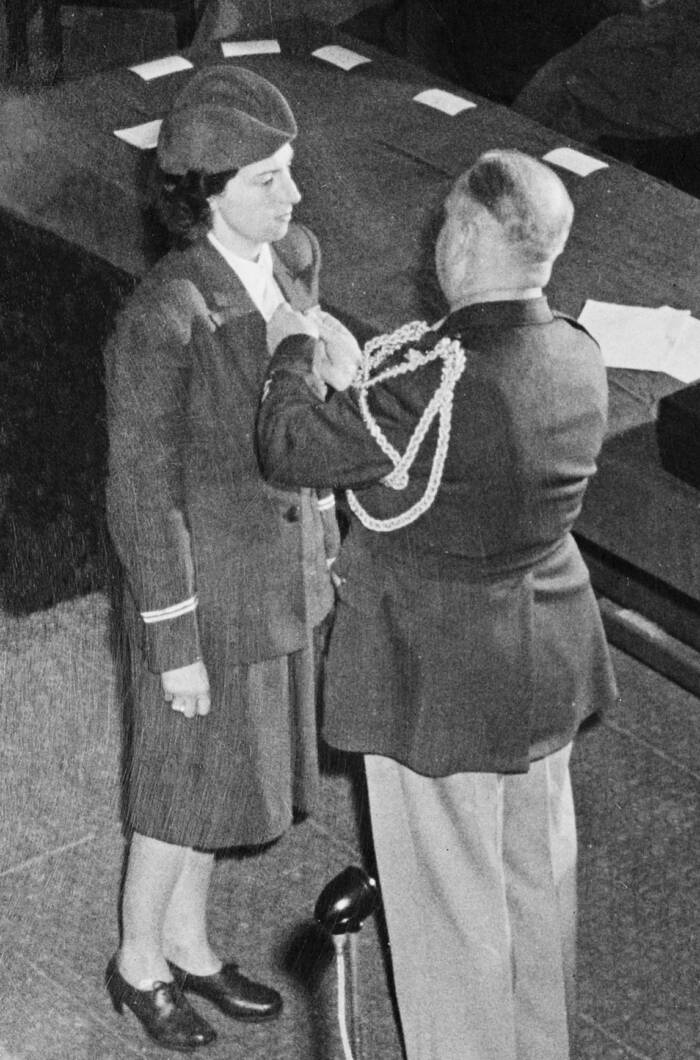
National Archives, The Hague/Wikimedia CommonsTrix Terwindt, the only female Special Operations Executive agent captured by Germany during the Englandspiel and one of the few who actually managed to survive the war.
The German counterintelligence operation ultimately came to an end on April 1, 1944, but by then, the damage had been done, and the incident highlighted the SOE’s shortcomings and the cleverness of German counterintelligence.
Thankfully, the SOE bounced back in the wake of the siege of Normandy on D-Day and the subsequent liberation of Paris that August, which involved the direct cooperation of the SOE and the French Resistance.
The Special Operations Executive At The End Of World War II
Toward the end of the war, the Special Operations Executive shifted focus from sabotage and large-scale disruption efforts behind enemy lines to supporting the Allied advance. They coordinated with local resistance groups to harass retreating German forces, gathered intelligence on remaining German troop movements and fortifications, and assisted with securing liberated areas and preventing the resurgence of Nazi activity.
They also readjusted their focus on the Far East, deploying some personnel to Southeast Asia to support resistance movements there against Japanese occupation, particularly in Burma and Malaya.
Once the Germans surrendered in May 1945, the SOE’s European operations rapidly dwindled, with agents either being demobilized or reassigned to other intelligence agencies.
And for years, much of the SOE’s work remained unknown, given the delicate and secretive nature of their missions. However, the lasting impact of their operation, now that much has been made public, greatly shaped future psychological warfare strategies.
In the decades since, there has also been some debate about the morality of specific methods used by the SOE, particularly when it came to targeting civilians during sabotage missions and aligning with resistance groups who didn’t necessarily agree with the Allied cause.
Still, as far as wartime intelligence groups are concerned, the SOE’s influence is undeniable.
After this in-depth look at the Special Operations Executive, see some of the most powerful photos of the Blitz endured by Britain at the outset of World War II. Then, learn about the Dunkirk evacuation of British forces fleeing the Nazis, which has understandably been dubbed a miracle.





